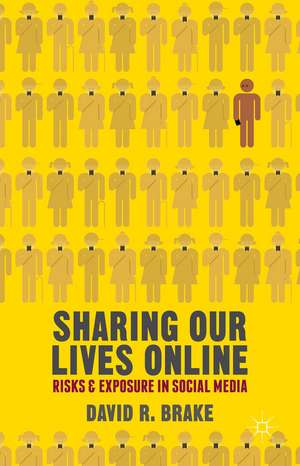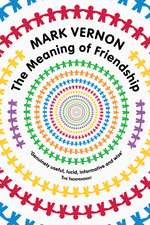Sharing our Lives Online: Risks and Exposure in Social Media
Autor David R. Brakeen Limba Engleză Paperback – 24 sep 2014
| Toate formatele și edițiile | Preț | Express |
|---|---|---|
| Paperback (1) | 375.26 lei 6-8 săpt. | |
| Palgrave Macmillan UK – 24 sep 2014 | 375.26 lei 6-8 săpt. | |
| Hardback (1) | 380.33 lei 6-8 săpt. | |
| Palgrave Macmillan UK – 24 sep 2014 | 380.33 lei 6-8 săpt. |
Preț: 375.26 lei
Nou
Puncte Express: 563
Preț estimativ în valută:
71.82€ • 74.60$ • 59.65£
71.82€ • 74.60$ • 59.65£
Carte tipărită la comandă
Livrare economică 03-17 februarie 25
Preluare comenzi: 021 569.72.76
Specificații
ISBN-13: 9780230320369
ISBN-10: 0230320368
Pagini: 193
Ilustrații: VIII, 193 p.
Dimensiuni: 140 x 216 x 15 mm
Greutate: 0.3 kg
Ediția:2014
Editura: Palgrave Macmillan UK
Colecția Palgrave Macmillan
Locul publicării:London, United Kingdom
ISBN-10: 0230320368
Pagini: 193
Ilustrații: VIII, 193 p.
Dimensiuni: 140 x 216 x 15 mm
Greutate: 0.3 kg
Ediția:2014
Editura: Palgrave Macmillan UK
Colecția Palgrave Macmillan
Locul publicării:London, United Kingdom
Cuprins
Table of Contents 1. Introduction 2. What is Risky and Who is at Risk? 3. How and Why Social Media Interaction is Different 4. Imagining the Reader 5. Time and Memory in Social Media 6. Towards a Radically Open Society 7. Conclusion Bibliography
Recenzii
“Sharing our lives online: Risks and exposure in social media, by David R. Brake is a comprehensive research-based book, dealing with the risks of sharing and revealing personal information online. … David R. Brake has extracted this book out of his doctoral dissertation, which makes it an interesting example for postdoctoral researchers to publish their research.” (Marziyeh Ebrahimi, Information, Communication & Society, Vol. 21 (12), 2018)
'In the age of social media sharing, David R. Brake presents a nuanced, evidence-based, and highly readable account of the dangers of exposing our lives online, grounded in understandable scientific and scholarly theory. Steering between uncritical enthusiasm at one pole and moral panic at the other - extremes that have characterized much of the public discourse about the effects of social media - Brake shows exactly how, and in what circumstances, sharing aspects of our personal lives online can be risky. Sharing our Lives Online also offers sound advice to individuals and parents who need to know what to do themselves to take advantage of social media without running into the pitfalls of oversharing, and need to know how to talk to their children about risks and cautions.' - Howard Rheingold
'[Sharing our Lives Online] provides a compelling account of the risks of online communication and the ways in which technologies are constructed to lead us to disclose more than we may think. [His research is] delicately woven into a rich discussion of the economic, technical and social factors that encourage self-disclosure [and features] a fascinating glimpse into blogging practice over time... An engaging and illuminating book.' TimesHigher Education
'Sharing Our Lives Online is an interesting resource for students and scholars in the fields of digital media and interpersonal communication but also for a non-academic audience interested in the risks of online self-exposure. Not only does it successfully combine theoretical discussion and empirical examination; it also draws upon specific case studies that make the reading particularly accessible.' - LSE Review of Books, 2014
'In the age of social media sharing, David R. Brake presents a nuanced, evidence-based, and highly readable account of the dangers of exposing our lives online, grounded in understandable scientific and scholarly theory. Steering between uncritical enthusiasm at one pole and moral panic at the other - extremes that have characterized much of the public discourse about the effects of social media - Brake shows exactly how, and in what circumstances, sharing aspects of our personal lives online can be risky. Sharing our Lives Online also offers sound advice to individuals and parents who need to know what to do themselves to take advantage of social media without running into the pitfalls of oversharing, and need to know how to talk to their children about risks and cautions.' - Howard Rheingold
'[Sharing our Lives Online] provides a compelling account of the risks of online communication and the ways in which technologies are constructed to lead us to disclose more than we may think. [His research is] delicately woven into a rich discussion of the economic, technical and social factors that encourage self-disclosure [and features] a fascinating glimpse into blogging practice over time... An engaging and illuminating book.' TimesHigher Education
'Sharing Our Lives Online is an interesting resource for students and scholars in the fields of digital media and interpersonal communication but also for a non-academic audience interested in the risks of online self-exposure. Not only does it successfully combine theoretical discussion and empirical examination; it also draws upon specific case studies that make the reading particularly accessible.' - LSE Review of Books, 2014
Notă biografică
David R. Brake (http://davidbrake.org/) is a communication scholar and pioneering web journalist who has been using and studying the internet for more than a quarter of a century.
Caracteristici
This is the first book to address the implications of the emergence of social media for society and to integrate its analysis with broader social theory, but ground its conclusions on fresh empirical evidence and on a focused review of relevant empirical studies It covers the emerging phenomenon of web '2.0' or the 'social web' to focus on the range of factors encouraging writing practices that risk harming both the authors' interpersonal relationships and their employment prospects Draws on new empirical research to reveal the ways in which individuals' understandings and expectations of online social interation can also encourage risky online behaviour It also offers practical guidance for educators, policy-makers, parents and students to reduce some of these dangers and outlines new avenues for online media research










